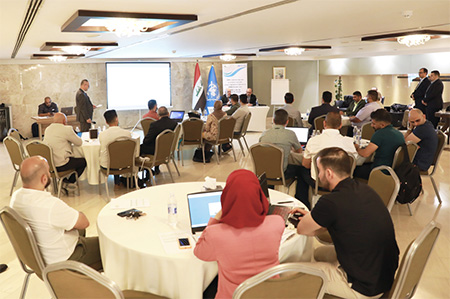 Baghdad, 2 June 2022 – The World Health Organization (WHO), in collaboration with the Iraqi Ministry of Health, is continuing to strengthen the health management information system through the implementation of the District Health Information System (DHIS-2) to enhance the quality of data collection, processing and reporting.
Baghdad, 2 June 2022 – The World Health Organization (WHO), in collaboration with the Iraqi Ministry of Health, is continuing to strengthen the health management information system through the implementation of the District Health Information System (DHIS-2) to enhance the quality of data collection, processing and reporting.
WHO is leading the implementation of DHIS2 in Iraq by supporting health information system stakeholders at different levels to develop a national implementation action plan addressing the prerequisites for governance/leadership, hardware, building human resource capacities and managing implementation modalities. Over the past three months, WHO has trained 110 health professionals and data specialists from national and subnational levels in using the DHIS2 platform to streamline the process of data entry, validation, analysis, report generation, use and dissemination.
The demand to enhance data collection and reporting systems at both health facility and national levels is growing among policy-makers, programme managers and development partners.
Implementing DHIS2 will help reduce the unnecessary burden on those working in data management and help data to be used efficiently for planning and decision-making.
"Effective health information systems can provide us with the knowledge and indicators we need to improve the population's health, advance the health system and achieve universal health coverage," said Dr Ahmed Zouiten, WHO Representative in Iraq.
"It's crucial to bridge the gap between policy-makers, health personnel and researchers to ensure the quality and accuracy of data. Narrowing this gap is not possible without a robust health information system."
In addition, to capacity-building activities, the WHO country office, with support from the WHO Regional Office and experts in DHIS2, conducted a rapid assessment and visited over 20 sites in Iraq in January 2022, including the Ministry of Health, primary health care centres, hospitals and other programmes.
"Improved collection, processing, analysis, dissemination and health information is a key step in achieving better health outcomes in Iraq," said Dr Aamr Bebany, the health system officer for the WHO country office in Iraq.
"DHIS2 will also provide us with a holistic picture for decision-makers and improve the quality and timeliness of data for better control of outbreaks," added Bebany.
DHIS2 has all the tools needed for most health information systems in one open-source and fully customizable software platform. It can be used either for a single purpose – like health, logistics or education data – or to triangulate aggregate and individual data from multiple sources and programmes in one integrated system.


